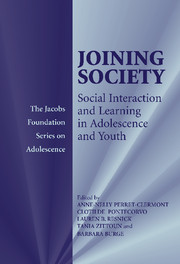Book contents
- Frontmatter
- Contents
- List of Contributors
- Foreword
- Preface
- I Introduction
- II Youth-Constructed Socialization
- III Personal Agency Through Collective Activity
- IV Learning in Practice and Discourse
- 11 From Learning Lessons to Living Knowledge: Instructional Discourse and Life Experiences of Youth in Complex Society
- 12 Practice and Discourse as the Intersection of Individual and Social in Human Development
- 13 Talking Matters: Studying the Use of Interdependencies of Individual and Collective Action in Youthful Learning
- 14 Young People's Use of Information and Communication Technologies: The Role of Sociocultural Abilities
- V Intergenerational Sites for Thinking
- VI Pathways to Adulthood in National Context
- Index
- References
13 - Talking Matters: Studying the Use of Interdependencies of Individual and Collective Action in Youthful Learning
Published online by Cambridge University Press: 08 January 2010
- Frontmatter
- Contents
- List of Contributors
- Foreword
- Preface
- I Introduction
- II Youth-Constructed Socialization
- III Personal Agency Through Collective Activity
- IV Learning in Practice and Discourse
- 11 From Learning Lessons to Living Knowledge: Instructional Discourse and Life Experiences of Youth in Complex Society
- 12 Practice and Discourse as the Intersection of Individual and Social in Human Development
- 13 Talking Matters: Studying the Use of Interdependencies of Individual and Collective Action in Youthful Learning
- 14 Young People's Use of Information and Communication Technologies: The Role of Sociocultural Abilities
- V Intergenerational Sites for Thinking
- VI Pathways to Adulthood in National Context
- Index
- References
Summary
Although my research is not directly focused on issues of learning and interaction in youth and adolescence, there are implications for the sort of research agenda that might be pursued in that area. My work examines how, in our interactions with others, we identify and use past experience, and in particular how we establish continuity and change in the social organization of our lives in social groupings and organizational settings. I am particularly interested in how we use interdependencies of experience as both individually and collectively relevant. For example, projects concerned with multiprofessional teamwork in hospital settings (Middleton, 1996) and with families talking about the significance of holiday photographs (Middleton & Edwards, 1990) examined what it is to be a “team” or a “family.” Such studies are both occasioned and made relevant in designating and claiming experience as individually and collectively accountable. Such an approach can be applied to a consideration of social interactions and learning in adolescence and youth. For example, we can examine how what-it-is-to-be-young is used as a conceptual resource in communicative activity concerning social interaction and learning in adolescence and youth. We do not need to describe a priori the conditions that define what it is like to be young. We can study how joining society is accomplished in terms of talk in which the topic of concern is what-it-is-to-be-young. We can examine possibilities of experience that may or may not be attributed to such a category.
- Type
- Chapter
- Information
- Joining SocietySocial Interaction and Learning in Adolescence and Youth, pp. 204 - 215Publisher: Cambridge University PressPrint publication year: 2003

